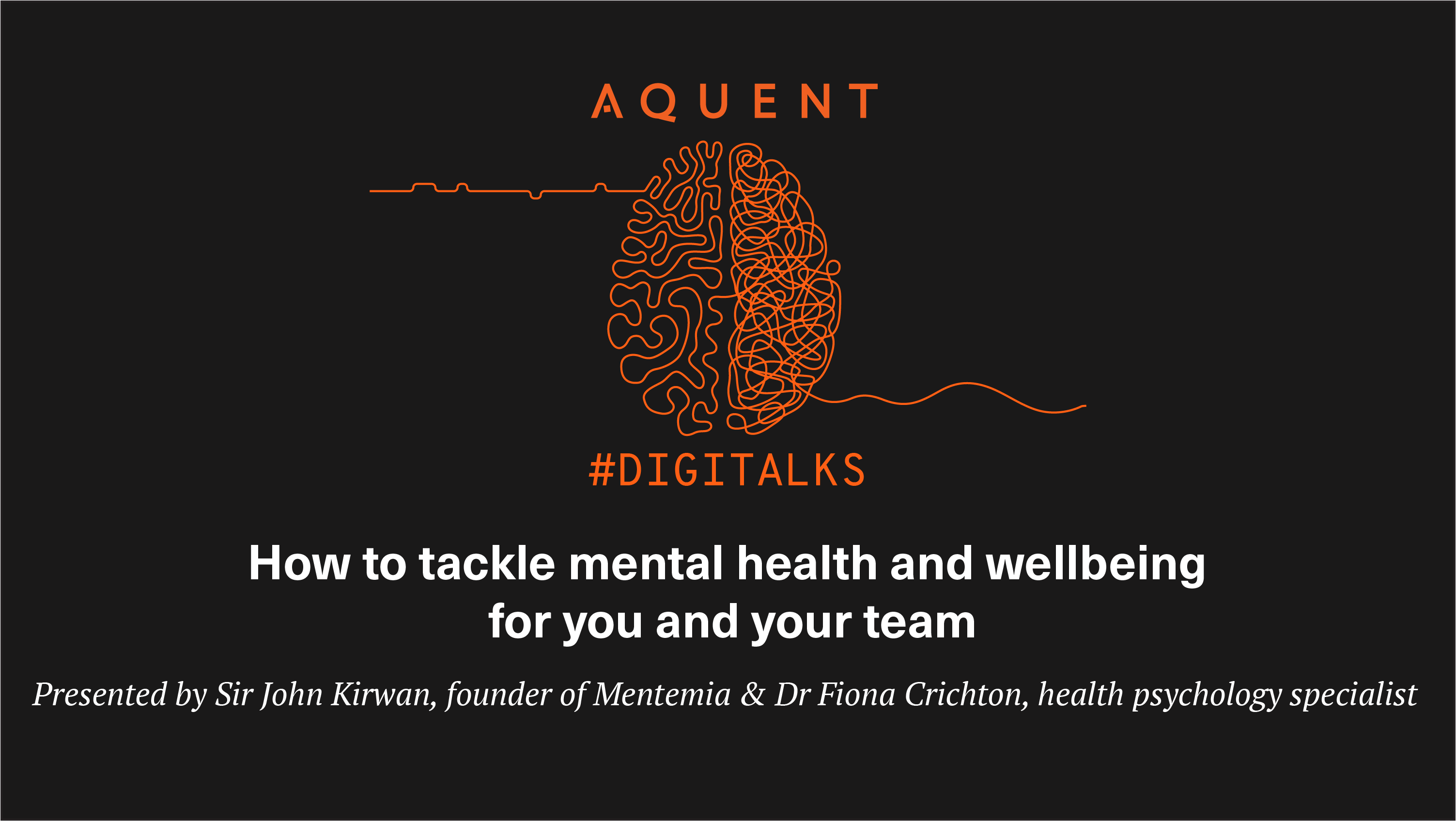All Black legend & mental health advocate Sir John Kirwan reached the very pinnacle of his sport – rugby union – and was one of the most recognised sports players of his era. But during that time he was hiding a serious mental health crisis.
After having ‘had a gutsful’ of feeling like this and hiding his mental health – he finally got help, and this started his journey from what he calls ‘just surviving – to thriving.’
From there he became the face of mental health in New Zealand, fronting depression.org and many campaigns to raise awareness on mental health. In particular he has helped a generation of people open their minds to talking more openly about how they are feeling, and asking ‘are you ok?’.
This huge contribution to mental health was as much a reason as his incredible All Black career when he was knighted in 2012.
Since then JK has continued to dedicate himself to mental wellbeing, now surfacing all the tools and techniques that keep him well everyday in his new app that came to market in Australia and New Zealand in April this year.
With the onset of the Covid-19 pandemic, JK and the team at Groov have been inundated by Australian and Kiwi businesses, on how best to navigate wellbeing in these unique times. So between JKs lived experience and Dr Fiona Crichton’s health psychology background, they have been advising on the best ways we can tackle mental health. And it may come as no surprise, but with all the nuances around leading teams, remote and hybrid working models as a result of the pandemic, there is still one truth – it all starts with you and preventing burnout in yourself.
So first up are some key pointers on how you can look after yourself, before some further tips on looking after your team, and fostering a culture of wellbeing.
It all starts with looking after yourself – preventing burnout.
You can’t look after your team if you’re not looking after yourself.
Our 12 tips to wellbeing now
- Focus on the things you can control
- Look for silver linings
- Acknowledge your feelings
- Keep to a routine
- Do things you enjoy
- Breathe
- Live in the now
- Take care of your body
- Stay connected
- Take time out from the news
- Avoid ‘I should' statements
- Be kind to yourself
And here’s some key bitesize tips to help you lead your teams, and foster a culture of wellbeing for yourself, and your people.
1. Lead by example and prioritise your wellbeing
Remote
You may be working at home, but don’t let home be all about work. Keep work from leaching into evenings or weekends. Take breaks and get fresh air. Eat well, keep active, and do some things you enjoy.
Office
If and when you are back in the office, make sure to communicate and model your own wellbeing plan, as that gives your team permission to ensure they look after and invest in themselves.
Top tip – You can't look after your team if you're not looking after yourself.
2. Be flexible
Remote
Expect things to be bumpy and for there to be glitches. Whether it’s setting up technology infrastructure at home or managing childcare – there will be challenges for each member of the team.
Office
When in the office make sure to discuss any challenges facing each team member in one-on-ones.
Top tip – Be accommodating and brain storm workable solutions together.
3. Create achievable wins
Remote
Set small, meaningful goals that can be achieved quickly. Quick wins boost confidence and set the stage for more success. They also provide a sense of accomplishment and control, and they provide a reason to celebrate.
Office
Set small, meaningful goals that can be achieved quickly
Top tip – Quick wins provide a reason to celebrate and set the stage for more success as a team
4. Check-in regularly
Remote
Stay connected with the team. Regular check-ins offer reassurance as well as the opportunity to raise concerns. Take advantage of technology. Instant messaging and video conferencing provide an effective way to collaborate and can reduce feelings of isolation.
Office
Maintain regular lines of communication to quickly identify what is working well and what needs to change.
Top tip – regular check-ins offer reassurance & the opportunity to raise concerns.
5. Communicate the plan
Remote
Have clear rules: Wellbeing, health & safety of remote workers. Information security & privacy.
Office
Have clear rules: Assume nothing. Logistics, processes and systems, hygiene & cleaning measures, proximity, hot-desking, close spaces, co-worker space, visiting customers.
Top tip – Everyone needs to feel safe and secure
6. Promote fun
Remote
Look at virtual ways to enhance fun and connection within the team. Create a designated place within your group-chat application for casual conversation. Use video chat to have a group lunch, or an afterwork get together.
Office
Plan for a bit of fun & laughter. It is a great way to release tension & build stronger teamwork.
Top tip – Teams that enjoy working together are generally happier (and more productive)
7. Encourage self-care
Remote
Ensure your team is aware of the importance of self-care right now. Talk about the ways you are looking after your own wellbeing. Encourage each team member to have their own wellbeing plan. And ask how you can best support them to make self-care a top priority.
Office
Add mental wellbeing to your health and safety. Use wellbeing strategies onsite e.g. stretching, deep breathing before meetings, walking meetings, fresh fruit deliveries.
Top tip – encourage each team member to have their own wellbeing plan
Why not build your own daily mental health plan?
For JK he ensures his daily mental health plan contains a range of things he can tap into from the following 6 pillars to ensure he thrives. Here’s some more on the 6 pillars to wellbeing to help you and your people.
The 6 pillars of mental wellbeing

Research shows if you do something from each of these six pillars every day, it will help you feel good, function well, and bounce back from stress.
Doing just one thing from each pillar every day is a way to look after your future self. Over time you should feel more positive, resilient, and able to get the most out of life.
They may be small daily actions but they can lead to big improvements in wellbeing.
Pillar One: Chill
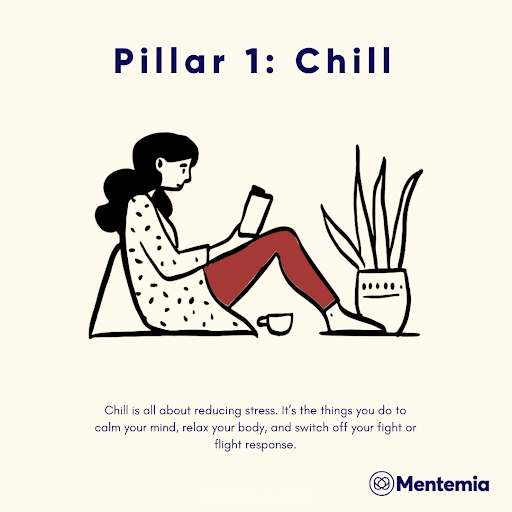
Chill is all about reducing stress. It’s the things you do to calm your mind, relax your body, and switch off your fight or flight response.
Did you know?** You can't be relaxed and stressed at the same time. Chilling tells your fight or flight response it's safe to relax.
JKs favourites – reading, breathing, walking slowly
Pillar Two: Do
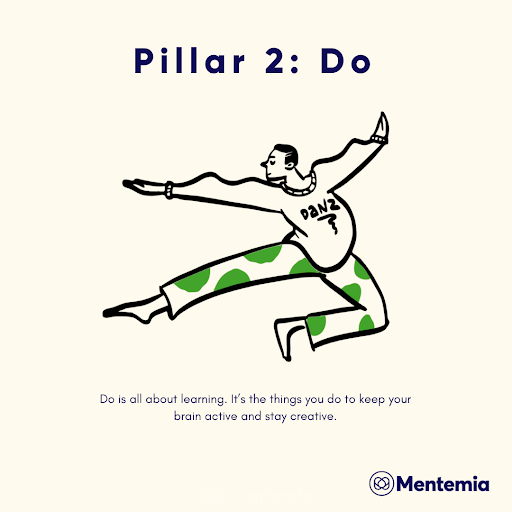
Do is all about learning. It’s the things you do to keep your brain active and [stay creative]
**Did you know?** When you set a goal of learning something new it helps to take small steps and notice progress along the way. This strengthens brain networks that expect positive outcomes, so you'll feel more optimistic and better about yourself.
JKs favourites – learning to play the guitar
Pillar Three: Connect
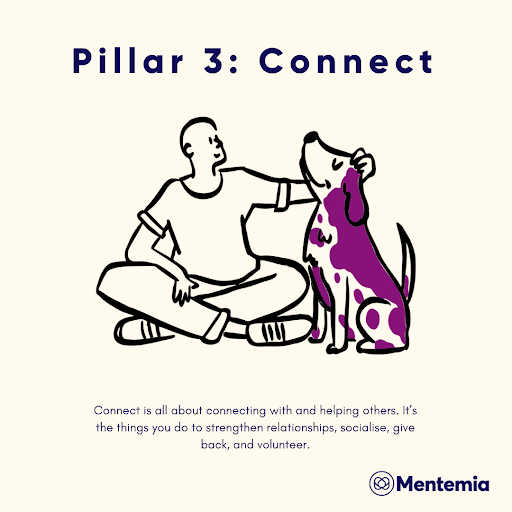
Connect is all about connecting with and helping others. It’s the things you do to strengthen relationships, socialise, give back, and volunteer.
**Did you know?** Connecting boosts “feel good” brain chemicals oxytocin, serotonin, and dopamine. Acts of kindness and helping others is associated with feeling happier and more satisfied with life.
JKs favourites – if the thought of a friend comes into your mind, give them a call and check-in.
Pillar Four: Move
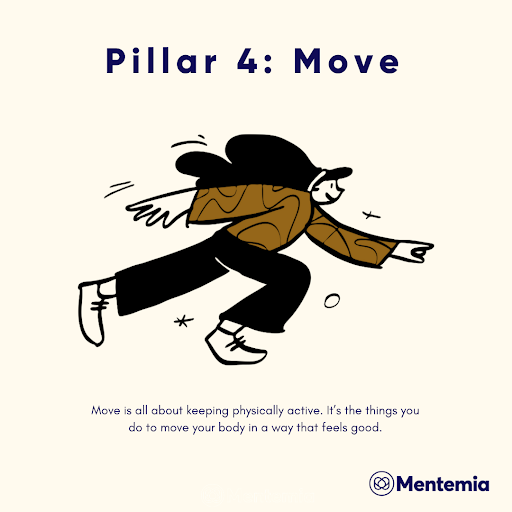
Move is all about keeping physically active. It’s the things you do to move your body in a way that feels good.
**Did you know?** Keeping active improves physical health, but it's also a way to raise your spirits. If you're not used to doing lots of exercise, just moving a little bit can be enough to lift your mood.
JKs favourites – he’s a big fan of swimming and cycling
Pillar Five: Celebrate
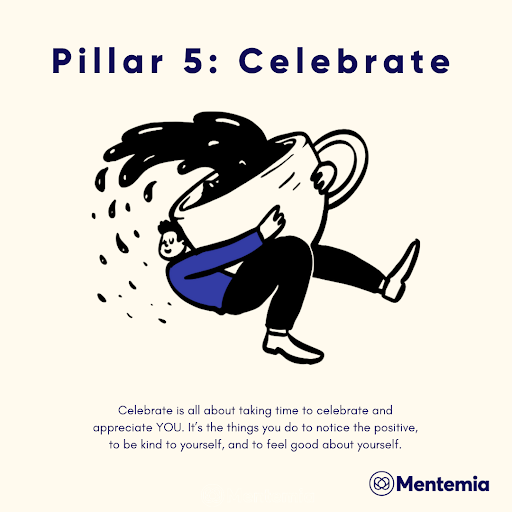
Celebrate is all about taking time to celebrate and appreciate YOU. It’s the things you do to notice the positive, to be kind to yourself, and to feel good about yourself.
**Did you know?** Evidence indicates that taking time to think kind thoughts about yourself leads to greater happiness and being better equipped to cope with stressful situations.
JKs favourites – Congratulations to me – recognising what he has done today and showing gratitude.
Pillar Six: Enjoy
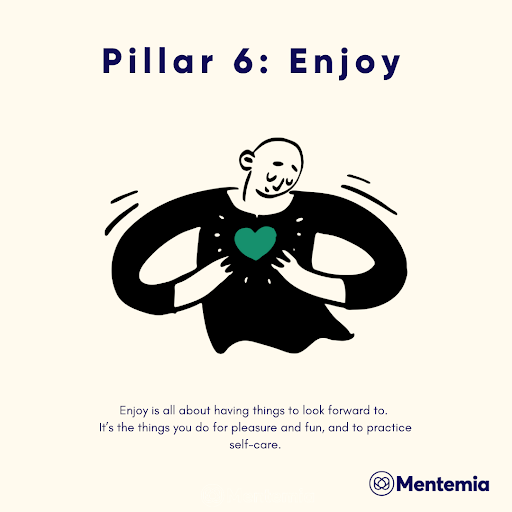
Enjoy is all about having things to look forward to. It’s the things you do for pleasure and fun, and to practice self-care.
**Did you know?** Making time for pleasure, fun and laughter can help boost “feel good” brain chemicals, serotonin and endorphins. This can help you feel more upbeat for the rest of the day and more resilient in the face of stress.
JKs favourites – have a goody basket with something to look forward to in it. JK loves to cook, it relaxes his mind and gives him something to look forward to each day.
We hope you find all these tips useful as you navigate this new normal!
About Groov
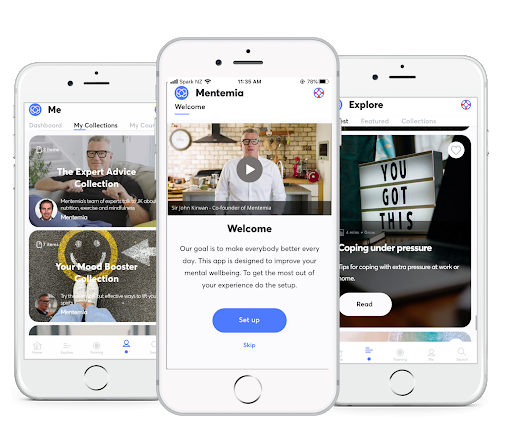
Groov is a wellbeing app originally developed for workplaces. An adapted free version was released across Australia & New Zealand to support people during the Covid-19 pandemic thanks to support from AIA (Australia) and Kiwibank, Westpac and the Ministry of Health (NZ). There have been close to 100,000 downloads of the app since its public release.
Co-founded by Sir John Kirwan, the app is packed with evidence-based ideas and tools to help people learn how to be well and stay well. It helps users deal with the most common stressors we experience in the modern connected world today – poor sleep, anxiety and stress.
These stressors, if left unattended, can significantly impact quality of life at home and work.
Mentemia is the fence at the top of the cliff rather than being the ambulance at the bottom. You discover what things can help you feel more energised, more productive, and better equipped for whatever the world throws at you.
The Groov app has been rolled out across leading Australian and Kiwi companies including the Royal Australasian College of Surgeons, Fletcher Building, Microsoft, AIA, Chorus & DB Breweries. To find out more, visit www.mentemia.com/au/business
Latest.

5 simple (but powerful) ways to shine in your design interview.
Job Seeker, Design

How to demonstrate the value of your design team in 2025
Thought Leadership, Design, Industry Trends, Leadership

Ace your interview: Words to watch out for.
Job Seeker
